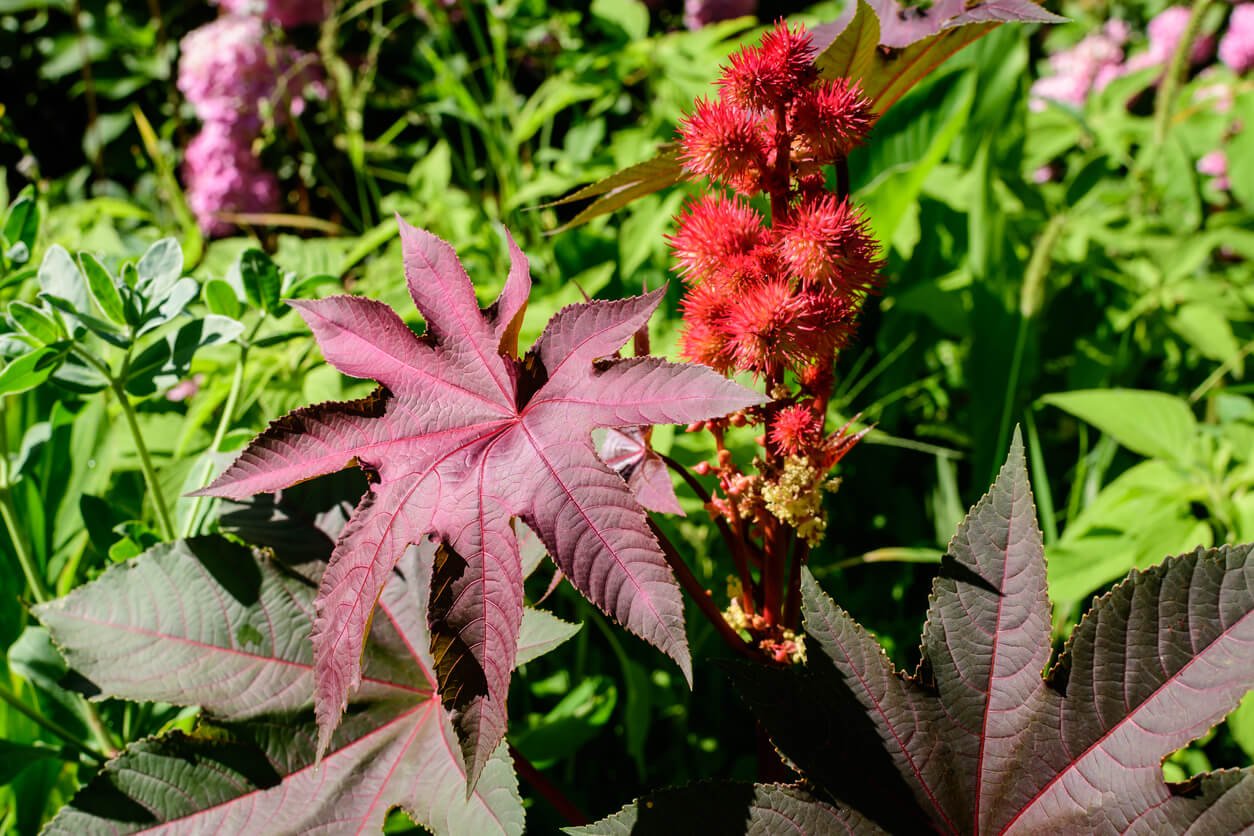Is Castor Oil Safe?
With a reputation for being able to regrow and thicken hair, moisturizing skin, and even induce labor, you might wonder, "is castor oil safe?" Today we'll look at the pros and cons of this popular vegetable oil.
Castor oil by itself is not a dangerous ingredient when used externally. It's widely used in soaps, lotions, etc all over the world with a long history of safety as an oil. However, castor oil production is problematic. Castor oil is in high demand because it has unique chemical properties that allow it to be used in many industries to make lubricants, inks, paints, greases, adhesives and other industrial products. In many cases the castor seed plant is genetically modified to increase yield and obtain certain fatty acid compositions. Genetically modified crops and monocultures can weaken ecosystems and deplete soils (among other side effects). In addition, these crops require fertilizers and pesticides which pollute the soil and groundwater.
 The use of a certified organic castor seed oil would of course not contribute to these problems. However, there is still the problem of the processing. The castor seed contains the poison ricin. Ricin is only slightly less toxic to the body than radioactive plutonium! The oil extraction process removes the toxin from the oil, but the waste material has to go somewhere. It requires extensive chemical processing to break down and it can end up in wastewater and landfills which then pollute the entire environment. Much of the worlds' castor oil is processed in countries that don't have strict environmental safety standards.
The use of a certified organic castor seed oil would of course not contribute to these problems. However, there is still the problem of the processing. The castor seed contains the poison ricin. Ricin is only slightly less toxic to the body than radioactive plutonium! The oil extraction process removes the toxin from the oil, but the waste material has to go somewhere. It requires extensive chemical processing to break down and it can end up in wastewater and landfills which then pollute the entire environment. Much of the worlds' castor oil is processed in countries that don't have strict environmental safety standards.
In addition, there are allergenic compounds found on the plant surface can cause permanent nerve damage, making the harvest of castor beans a human health risk for the workers involved. So, although as a finished product it's safe for use, I feel it's not a responsible ingredient to use because of the safety risks involved with the processing and harvest of the plant. We have found that other oils such as sunflower and coconut do just as good or better a job at moisturizing skin without these negative side effects.
As for its reputation to cure baldness, thicken eyelashes or replenish over-tweezed eyebrows, its claims are on shaky scientific ground. One such claim:
Castor oil’s principle component – ricinoleic acid – has been scientifically proven to stimulate the production of Prostaglandin (PGE2) when applied to the scalp. Enhanced production of this lipid, particularly in bald spots, enriches hair follicles and encourages regeneration of hair.
While it may sound legitimate, the science behind the claims have been misinterpreted in more ways than one.
Yes, the fatty acids in castor oil are primarily ricinoleic acid. However, oils don't just contain free fatty acids. In castor and all oils, the fatty acids are arranged in to molecules called triglycerides: three fatty acids held together by a glycerol group. (Aka glycerin.) So, while castor oil can be broken down to extract ricinoleic acid, castor oil in its raw state doesn't contain much free ricinoleic acid. Putting castor oil on your skin and hoping it will affect your prostaglandins is like putting a bottle of Aspirin on your head and hoping it will get rid of your headache. Essentially, the ricinoleic acid is still in its "wrapper" in castor oil.
There is one study that illustrates ricinoleic acid's effect on prostaglandins, however, it was when taken internally. The digestive system is able to break down the castor oil and turn it in to free ricinoleic acid, which can interact with prostaglandin receptors and create a laxative effect and potentially be used to induce labor. (Although the mechanisms are still unclear and it may not be safe to do so.) Prostaglandins do have some kind of mechanism in the hair follicle, however, their function continues to be unclear. And the effects of putting ricinoleic acid on hair is also unclear. One case study in 2017 found that castor and coconut oil caused immediate "felting" of a woman's hair, ie, it turned her hair into immediate dreadlocks that had to be removed.
Sources:
https://agresearchmag.ars.usda.gov/2001/jan/plant/
https://pubmed.ncbi.nlm.nih.gov/28932063/
Recent Posts
-
Is Charcoal Safe in Deodorant?
Activated charcoal has become a popular natural ingredient in toothpaste, deodorant, soaps, facial c …5th Mar 2024 -
Is Stevia an Endocrine Disruptor?
Is Stevia an Endocrine Disruptor?Stevia rebaudiana, an herb native to Paraguay and Brazil, contains …9th Feb 2024 -
Is Aloe Vera Toxic?
Containing more than 200 different chemical compounds, aloe vera plants and extracts have long been …9th Feb 2024

